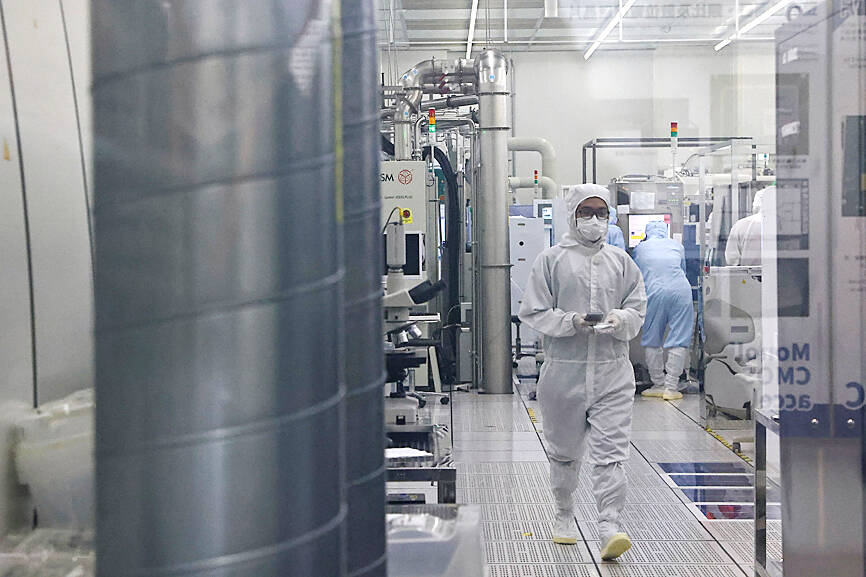Representatives from five high-ranking Taiwanese universities this week toured central and eastern Europe to promote scholarships in semiconductor research aimed at attracting mathematics and physics talent from the region to pursue further studies in Taiwan.
The academic delegation comprised officials from National Taiwan University (NTU), National Cheng Kung University, National Tsing Hua University, National Yang Ming Chiao Tung University and National Sun Yat-sen University.
The tour group visited the Czech Republic, Poland and Lithuania, where they held presentations to inform local students about the Taiwan Semiconductor Scholarship Program, said NTU vice president for international affairs Yuan Hsiao-wei (袁孝維), who was part of the delegation.

Photo: Ann Wang, Reuters
The delegation visited Masaryk University in the Czech Republic on Monday last week and the University of Warsaw in Poland on Wednesday, as well as Lithuania’s Kaunas University of Technology on Thursday and Vilnius University on Friday.
The delegation concluded its tour yesterday at the Slovak University of Technology in Bratislava, Slovakia.
The Soviet influence on central and eastern European countries helped students in the region excel in math and physics, Yuan said from Prague on Wednesday.
The delegation has received positive feedback since its first scholarship presentation in the Czech Republic, she said.
The idea to offer central and eastern European students scholarships for semiconductor research — covering tuition fees, stipends and flight tickets — was proposed by the National Development Council following a delegation’s visit to the Czech Republic in October last year.
Information on the Web site of the Taiwan Semiconductor Scholarship Program shows that master’s students enrolled in the program would each get a tuition subsidy of NT$80,000 per academic year, a monthly stipend of NT$25,000 and a round-trip ticket to Taiwan.
Each master’s student involved in the scholarship program would be sponsored for a maximum of two years, with the tuition subsidy, stipends and airfare amounting to a total of no more than 27,000 euros (US$26,960).
As for doctoral students in the program, in addition to the same tuition stipend and round-trip tickets as master’s students, they would receive a monthly stipend of NT$40,000, according to the Web site. Doctoral students could have the scholarship for up to four years and receive a total of 74,000 euros.
However, the number of scholarships has not been finalized by the Ministry of Foreign Affairs, which finances the program.
Despite interest in the program, European universities have expressed concern that scholarship students might stay and work in Taiwan after graduation, rather than foster semiconductor development in their home countries, Yuan said.
Yuan said that was a possibility, adding that the students could contribute to their home industries if Taiwan invested in the semiconductor industries in those nations.
“The goal of the program is to equip students with adequate know-how about chips and make them internationally competitive,” she said.
The program also marks a new step for Taiwan’s tertiary education sector given that Taiwan’s universities have never had this kind of cooperation with central and eastern Europe before, NTU vice president for academic affairs Stone Ding (丁詩同) said.
The cooperation is a trial, through which each side would get to know the needs of the other and see if there is potential for further cooperation, Ding said.

POWERING UP: PSUs for AI servers made up about 50% of Delta’s total server PSU revenue during the first three quarters of last year, the company said Power supply and electronic components maker Delta Electronics Inc (台達電) reported record-high revenue of NT$161.61 billion (US$5.11 billion) for last quarter and said it remains positive about this quarter. Last quarter’s figure was up 7.6 percent from the previous quarter and 41.51 percent higher than a year earlier, and largely in line with Yuanta Securities Investment Consulting Co’s (元大投顧) forecast of NT$160 billion. Delta’s annual revenue last year rose 31.76 percent year-on-year to NT$554.89 billion, also a record high for the company. Its strong performance reflected continued demand for high-performance power solutions and advanced liquid-cooling products used in artificial intelligence (AI) data centers,

SIZE MATTERS: TSMC started phasing out 8-inch wafer production last year, while Samsung is more aggressively retiring 8-inch capacity, TrendForce said Chipmakers are expected to raise prices of 8-inch wafers by up to 20 percent this year on concern over supply constraints as major contract chipmakers Taiwan Semiconductor Manufacturing Co (TSMC, 台積電) and Samsung Electronics Co gradually retire less advanced wafer capacity, TrendForce Corp (集邦科技) said yesterday. It is the first significant across-the-board price hike since a global semiconductor correction in 2023, the Taipei-based market researcher said in a report. Global 8-inch wafer capacity slid 0.3 percent year-on-year last year, although 8-inch wafer prices still hovered at relatively stable levels throughout the year, TrendForce said. The downward trend is expected to continue this year,

Vincent Wei led fellow Singaporean farmers around an empty Malaysian plot, laying out plans for a greenhouse and rows of leafy vegetables. What he pitched was not just space for crops, but a lifeline for growers struggling to make ends meet in a city-state with high prices and little vacant land. The future agriculture hub is part of a joint special economic zone launched last year by the two neighbors, expected to cost US$123 million and produce 10,000 tonnes of fresh produce annually. It is attracting Singaporean farmers with promises of cheaper land, labor and energy just over the border.

US actor Matthew McConaughey has filed recordings of his image and voice with US patent authorities to protect them from unauthorized usage by artificial intelligence (AI) platforms, a representative said earlier this week. Several video clips and audio recordings were registered by the commercial arm of the Just Keep Livin’ Foundation, a non-profit created by the Oscar-winning actor and his wife, Camila, according to the US Patent and Trademark Office database. Many artists are increasingly concerned about the uncontrolled use of their image via generative AI since the rollout of ChatGPT and other AI-powered tools. Several US states have adopted